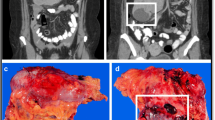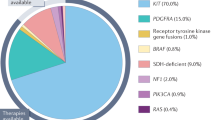Opinion statement
Gastrointestinal stromal tumors (GISTs) are the most common mesenchymal tumors of the gastrointestinal tract. Clinicians previously classified GISTs as “benign≓ or “malignant,≓ but now place resected tumors in risk categories that are based on size and mitotic rate. Historically, GIST patients were managed with surgery alone, as chemotherapy and radiotherapy have minimal activity in this disease. In the pre-imatinib era, patients with recurrent or metastatic disease generally did very poorly. GIST therapy was revolutionized following the discovery of oncogenic mutations in the c-kit gene, as well as in the platelet-derived growth factor receptor. Subsequently, it has been confirmed that the KIT receptor tyrosine kinase is both a diagnostic marker and a useful therapeutic target in GIST. Imatinib, a potent inhibitor of KIT activity, is now standard frontline therapy for advanced GIST. With the introduction of imatinib, there have been dramatic improvements in response rates, time to progression, and survival. Imatinib is now being investigated and shows promise in the neoadjuvant and adjuvant settings. Unfortunately, many patients eventually recur or progress during imatinib therapy. For these patients, imatinib dose escalation and/or surgical evaluation are appropriate. Additionally, a novel tyrosine kinase inhibitor such as SU11248 (sunitinib) is a reasonable option for progressive, imatinib-resistant disease. With the identification of other downstream pathways, several other promising therapies are under current investigation either alone or in combination with imatinib and surgery.
Similar content being viewed by others
References and Recommended Reading
Blanke CD, Heinrich M, Eisenberg BL:Epidemiology of GIST. Am J Gastroenterol 2005, 100:2366.
Nilsson B, Bumming P, Meis-Kindblom JM, et al.:Gastrointestinal stromal tumors:the incidence, prevalence, clinical course, and prognostication in the pre-imatinib mesylate—a population-based study in western Sweden. Cancer 2005, 103:821–829. This study provides the best available epidemiologic data for GISTs, from which US incidence and prevalence are extrapolated.
DeMatteo RP, Lewis JJ, Leung D, et al.:Two hundred gastrointestinal stromal tumors:recurrence patterns and prognostic factors for survival. Ann Surg 2000, 231:51–58. This paper presents excellent retrospective data from 200 surgical GIST patients. It provides useful information on surgical outcomes and the natural history of the disease across a diverse GIST patient population.
Rubin BP, Singer S, Tsao C, et al.:KIT activation is a ubiquitous feature of gastrointestinal stromal tumors. Cancer Res 2001, 61:8118–8121.
Heinrich MC, Corless CL, Duensing A, et al.:PDGFRA activating mutations in gastrointestinal stromal tumors. Science 2003, 299:708–710. This important translational research demonstrated that PDGFRA mutations have the same downstream targets as KIT mutations; it establishes this receptor's importance in GIST pathogenesis.
Heinrich MC, Corless CL:Gastric GI stromal tumors (GISTs):the role of surgery in the era of targeted therapy. J Surg Oncol 2005, 90:195–207.
Miettinen M, Sobin LH, Lasota J:Gastrointestinal stromal tumors of the stomach:a clinicopathologic, immunohistochemical, and molecular genetic study of 1765 cases with long-term follow-up. Am J Surg Pathol 2005, 29:52–68.
Demetri GD, Benjamin RS, Blanke CD, et al.:NCCN Task Force Report:Optimal management of patients with gastrointestinal stromal tumor (GIST)—expansion and update of NCCN Clinical Practice Guidelines. J Natl Comp Cancer Network 2004, 2:S1-S26. These guidelines represent the North American consensus standard of care for the diagnosis, staging, and treatment of GIST as well as many other malignancies.
Bandoh T, Isoyama T, Toyoshima H:Submucosal tumors of the stomach:a study of 100 operative cases. Surgery 1993, 113:498–506.
Tamerisa R, Irisawa A, Bhutani MS:Endoscopic ultrasound in the diagnosis, staging, and management of gastrointestinal and adjacent malignancies. Med Clin North Am 2005, 89:139–158, viii.
Okubo K, Yamao K, Nakamura T, et al.:Endoscopic ultrasound-guided fine needle aspiration biopsy for the diagnosis of gastrointestinal stromal tumors in the stomach. J Gastroenterol 2004, 39:747–753.
Fletcher CD, Berman JJ, Corless CL, et al.:Diagnosis of gastrointestinal stromal tumors:a consensus approach. Hum Pathol 2002, 33:459–465.
Von Mehren M, Watson, JC: Gastrointestinal stromal tumors. Hematol Oncol Clin North Am 2005, 19:547–564.
Ng EH, Pollock RE, Munsell MF, et al.:Prognostic factors influencing survival in gastrointestinal leiomyosarcomas. Implications for surgical management and staging. Ann Surg 1992, 215:68–77.
Mudan S, Conlon K, Woodruff J, et al.:Salvage surgery for patients with recurrent gastrointestinal sarcoma:prognostic factors to guide patient selection. Cancer 2000, 88:66–74.
Clary BM, DeMatteo RP, Lewis JJ, et al.:Gastrointestinal stromal tumors and leiomyosarcoma of the abdomen and retroperitoneum:a clinical comparison. Ann Surg Oncol 2001, 8:290–299.
Mavligit GM, Zukwiski AA, Ellis LM, et al.:Gastrointestinal leiomyosarcoma metastatic to the liver. Durable tumor regression by hepatic chemoembolization infusion with cisplatin and vinblastine. Cancer 1995, 75:2083–2088.
Rajan DK, Soulen MC, Clark TW, et al.:Sarcomas metastatic to the liver:response and survival after cisplatin, doxorubicin, mitomycin-C, ethiodol, and polyvinyl alcohol chemoembolization. J Vasc Interv Radiol 2001, 12:187–193.
Eilber F, Rosen G, Forscher C, et al.:Surgical resection and intraperitoneal chemotherapy for recurrent abdominal sarcomas. Ann Surg Oncol 1999, 6:645–650.
Tepel J, Hinz S, Klomp H, et al.:Intraoperative radiofrequency ablation (RFA) for irresectable liver malignancies. Eur J Surg Oncol 2004, 30:551–555.
Edmonson JH, Marks RS, Buckner JC, et al.:Contrast of response to dacarbazine, mitomycin, doxorubicin, and cisplatin (DMAP) plus GM-CSF between patients with advanced malignant gastrointestinal stromal tumors and patients with other advanced leiomyosarcomas. Cancer Invest 2002, 20:605–612.
DeMatteo RP, Heinrich MC, El-Rifai WM, et al.:Clinical management of gastrointestinal stromal tumors:before and after STI-571. Hum Pathol 2002, 33:466–477.
Kantarjian H, Sawyers C, Hochhaus A, et al.:Hematologic and cytogenetic responses to imatinib mesylate in chronic myelogenous leukemia. N Engl J Med 2002, 346:645–652.
Heinrich MC, Griffith DJ, Druker BJ, et al.:Inhibition of c-kit receptor tyrosine kinase activity by STI 571, a selective tyrosine kinase inhibitor. Blood 2000, 96:925–932.
Tuveson DA, Willis NA, Jacks T, et al.:STI571 inactivation of the gastrointestinal stromal tumor c-KIT oncoprotein:biological and clinical implications. Oncogene 2001, 20:5054–5058.
Van Oosterom AT, Judson I, Verweij J, et al.:Safety and efficacy of imatinib (STI571) in metastatic gastrointestinal stromal tumours:a phase I study. Lancet 2001, 358:1421–1423.
Verweij J, Van Oosterom A, Blay JY, et al.:Imatinib mesylate (STI-571 Glivec(R), Gleevec) is an active agent for gastrointestinal stromal tumours, but does not yield responses in other soft-tissue sarcomas that are unselected for a molecular target. Results from an EORTC Soft Tissue and Bone Sarcoma Group Phase II Study. Eur J Cancer 2003, 39:2006–2011.
Von Mehren M, Blanke CD, Joesuu H, et al.: High incidence of durable responses induced by imatinib mesylate (Gleevec) in patients with unresectable and metastatic gastrointestinal stromal tumors (GISTs) [abstract]. Proc Am Soc Clin Oncol 2002, 21:403a.
Blanke CD, Joensuu H, Demetri MC, et al.:Outcome of advanced gastrointestinal stromal tumor (GIST) patients treated with imatinib mesylate:four-year follow-up of a phase II randomized trial. Abstract presented at the American Society for Clinical Oncology 2006 Gastrointestinal Cancers Symposium. San Francisco; January 26-28, 2006. Abstract 7. At present, these data from the US-Finnish phase II trial represent the longest-term follow-up available for the use of imatinib in the advanced, recurrent, or metastatic setting. Mutational status was analyzed and found to be an important predictor of imatinib response.
Verweij J, Casali PG, Zalcberg J, et al.:Progression-free survival in gastrointestinal stromal tumours with high-dose imatinib:randomised trial. Lancet 2004, 364:1127–1134. This phase III study by the EORTC randomized patients with metastatic unresectable GISTs to imatinib, 400 mg daily versus 400 mg twice daily. The study documented an advantage to twice-daily dosing with respect to progression-free survival, the primary end point of the study.
Benjamin RS, Rankin C, Fletcher C, et al.:Phase III dose randomized study of imatinib mesylate (STI571) for GIST:Intergroup S0033 early results. Proc Am Soc Clin Oncol 2003, 22:814. Like [30], this similar phase III study by SWOG and other US and Canadian investigators likewise randomized patients to imatinib, 400 mg once versus twice daily, but used overall survival as well as progression-free survival as primary end points. It found no statistical difference in overall or progression-free survival between the arms.
Heinrich M, Corless C, Blanke C, et al.:KIT mutational status predicts response to STI571 in patients with metastatic gastrointestinal tumors (GISTs). Proc Am Soc Clin Oncol 2002, 21:6a.
Van den Abbeele AD, Badawi RD, Cliché J-P, et al.:18FFDG-PET predicts response to imatinib mesylate (Gleevec) in patients with advanced gastrointestinal stromal tumors (GIST). Abstract presented at the 38th Annual Meeting of the American Society of Clinical Oncology. Orlando, FL; May 18-21, 2002. Abstract 1610.
Dematteo RP, Antonescu CR, Chadaram V, et al.:Adjuvant imatinib mesylate in patients with primary high risk gastrointestinal stromal tumor (GIST) following complete resection:safety results from the US Intergroup phase II trial ACOSOG Z9000. Abstract presented at the 41st Annual Meeting of the American Society of Clinical Oncology. Orlando, FL; May 13-17, 2005. Abstract 9009.
US National Institutes of Health Clinical Trials:Available at:http://www.clinicaltrials.gov/ct/show/NCT00041197?order=1. Accessed May 2, 2006.
US National Institutes of Health Clinical Trials:Available at:http://www.clinicaltrials.gov/ct/show/NCT00103168?order=3. Accessed April 24, 2006.
US National Institutes of Health Clinical Trials:Available at:http://www.clinicaltrials.gov/ct/show/NCT00116935?order=5. Accessed April 26, 2006.
Bumming P, Andersson J, Meis-Kindblom JM, et al.:Neoadjuvant, adjuvant and palliative treatment of gastrointestinal stromal tumours (GIST) with imatinib:a centre-based study of 17 patients. Br J Cancer 2003, 89:460–464.
US National Institutes of Health Clinical Trials:Available at:http://www.clinicaltrials.gov/ct/show/NCT00028002. Accessed April 12, 2006.
Tamborini E, Bonadiman L, Greco A, et al.:A new mutation in the KIT ATP pocket causes acquired resistance to imatinib in a gastrointestinal stromal tumor patient. Gastroenterology 2004, 127:294–299.
Rankin C, von Mehren M, Blanke C, et al.:Dose effect of imatinib (IM) in patients (pts) with metastatic GIST-phase III Sarcoma Group Study S0033. Proc Am Soc Clin Oncol 2004, 22:9005a.
Van Oosterom A, Dumez H, Desai J, et al.:Combination signal transduction inhibition:a phase I/II trial of the oral mTOR-inhibitor everolimus (E, RAD001) and imatinib mesylate (IM) in patients (pts) with gastrointestinal stromal tumor (GIST) refractory to IM. Proc Am Soc Clin Oncol 2004, 22:3002a.
Maki RG, Fletcher A, Heinrich MC, et al.:Results from a continuation trial of SU11248 in patients (pts) with imatinib (IM)-resistant gastrointestinal stromal tumor (GIST). Abstract presented at the 41st Annual Meeting of the American Society of Clinical Oncology. Orlando, FL; May 13–17, 2005. Abstract 9001.
Demetri GD, van Oosterom AT, Blackstein M, et al.:Phase 3, multicenter, randomized, double-blind, placebo-controlled trial of SU11248 in patients following failure of imatinib for metastatic GIST. Abstract presented at the American Society for Clinical Oncology 2006 Gastrointestinal Cancers Symposium. San Francisco; January 26-28, 2006. Abstract 8. This important phase III trial randomized imatinib-resistant and -intolerant patients to imatinib plus or minus sunitinib. The study documents significant improvements in time to progression with the addition of sunitinib and provides the rationale for recent FDA approval of the drug.
Reichardt P, Pink D, Lindner T, et al.:A phase I/II trial of the oral PKC-inhibitor PKC412 (PKC) in combination with imatinib mesylate (IM) in patients (pts) with gastrointestinal stromal tumor (GIST) refractory to IM. Abstract presented at the 41st Annual Meeting of the American Society of Clinical Oncology. Orlando, FL; May 13-17, 2005. Abstract 3016.
Dileo P, Bauer S, Van den Abbeele A, et al.:Results with AMN107, a novel kinase inhibitor, in gastrointestinal stromal tumor (GIST):preclinical rationale and early results in a patient with imatinib-resistant GIST. Abstract presented at the American Society of Clinical Oncology 2006 Gastrointestinal Cancers Symposium. San Francisco; January 26-28, 2006. Abstract 53.
US National Institutes of Health Clinical Trials:Available at:http://www.clinicaltrials.gov/ct/show/NCT00135005?order=1. Accessed April 12, 2006.
The Life Raft Group. Available at:http://www.liferaftgroup. org. Accessed May 2, 2006. This website is an outstanding resource for both clinicians and patients, providing comprehensive information on both standard and novel therapies for GIST. Details of current clinical trials are provided, as well as expert opinions by leaders in this field.
Author information
Authors and Affiliations
Rights and permissions
About this article
Cite this article
Schnadig, I.D., Blanke, C.D. Gastrointestinal stromal tumors: Imatinib and beyond. Curr. Treat. Options in Oncol. 7, 427–437 (2006). https://doi.org/10.1007/s11864-006-0018-5
Issue Date:
DOI: https://doi.org/10.1007/s11864-006-0018-5




